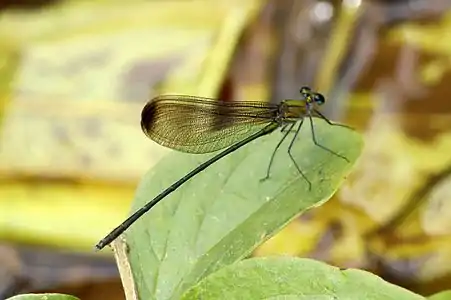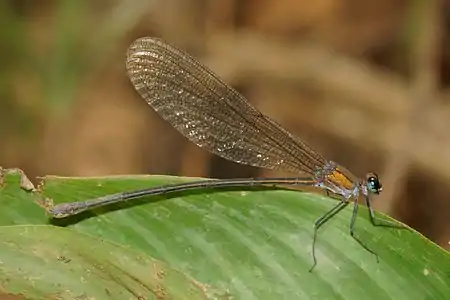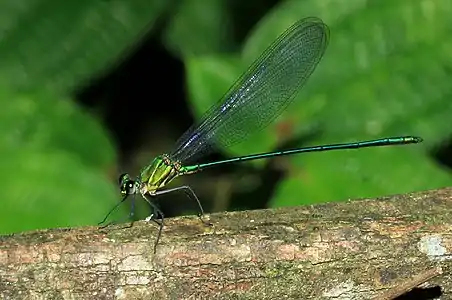| Vestalis submontana | |
|---|---|
 | |
| Male | |
 | |
| Female | |
| Scientific classification | |
| Domain: | Eukaryota |
| Kingdom: | Animalia |
| Phylum: | Arthropoda |
| Class: | Insecta |
| Order: | Odonata |
| Suborder: | Zygoptera |
| Family: | Calopterygidae |
| Genus: | Vestalis |
| Species: | V. submontana |
| Binomial name | |
| Vestalis submontana Fraser, 1934 | |
| Synonyms | |
| |
Vestalis submontana[2][3] is a species of damselfly belonging to the family Calopterygidae. It is principally found in the Western Ghats of India,[4][5] with some records further east.[1]
Frederic Charles Fraser described two new subspecies Vestalis gracilis amaena and Vestalis apicalis amaena in 1929[6] and later gave replacement names Vestalis gracilis montana and Vestalis apicalis submontana in 1934. The type specimens were from Nilgiri mountains in Western Ghats of South India.[7][4]
Matti Hämäläinen[8] studied the type specimens of these taxa and other material preserved in collections of BMNH (London), IRSN (Brussels) and RMNH (Leiden) in 2011. He concluded that there is striking structural and colour differences which indicate that submontana is a distinct species. And its sympatric occurrence with V. apicalis and V. gracilis alone rules out its former subspecies status. So V. a. submontana is now considered as a separate species Vestalis submontana Fraser 1934 and Vestalis gracilis montana Fraser, 1934 a synonym of it.[4]
Description and habitat
It is similar to Vestalis apicalis and Vestalis gracilis; but the face is black and the black apex of wings much restricted, occupying only about 2·5 mm. It is not sharply defined in young males and in females. The body color is dull golden-bronzed metallic green. It is a bit smaller than the other two species.[7][4] The structure of the male appendages is also different. The inferior appendages are proportionally longer than the other two species.[4]
 Male (sub-adult)
Male (sub-adult) Caudal appendages of male (lateral view)
Caudal appendages of male (lateral view) Caudal appendages of male (ventral view)
Caudal appendages of male (ventral view)
It is found in the upland forest streams in South India.[7][4]
See also
References
- 1 2 Dow, R.A. (2021). "Vestalis submontana". IUCN Red List of Threatened Species. 2021: e.T139121999A176111432. doi:10.2305/IUCN.UK.2021-3.RLTS.T139121999A176111432.en. Retrieved 9 March 2023.
- ↑ Paulson, D.; Schorr, M.; Abbott, J.; Bota-Sierra, C.; Deliry, C.; Dijkstra, K.-D.; Lozano, F. (2023). "World Odonata List". OdonataCentral, University of Alabama. Retrieved 14 Mar 2023.
- ↑ M. Hamalainen. "Calopterygoidea of the World" (PDF). caloptera.com. Retrieved 2017-02-20.
- 1 2 3 4 5 6 M. Hamalainen. "Notes on the taxonomic status of Vestalis submontana Fraser, 1934 from South India (Zygoptera: Calopterygidae)" (PDF). Notulae Odonatologicae. 7 (8): 69–76. Archived from the original (PDF) on 20 February 2017.
- ↑ K.A., Subramanian; K.G., Emiliyamma; R., Babu; C., Radhakrishnan; S.S., Talmale (2018). Atlas of Odonata (Insecta) of the Western Ghats, India. Zoological Survey of India. pp. 72–73. ISBN 9788181714954.
- ↑ Fraser, F. C. "Indian Dragonflies". The Journal of the Bombay Natural History Society. 33 (2–3): 583–584. Retrieved 13 October 2018.
- 1 2 3 Fraser, F.C. (1934). The Fauna of British India, including Ceylon and Burma, Odonata Vol. II. Red Lion Court, Fleet Street, London: Taylor and Francis. pp. 128, 130.
- ↑ "Matti Hämäläinen". Naturalis. Retrieved 2017-02-20.
External links
![]() Media related to Vestalis submontana at Wikimedia Commons
Media related to Vestalis submontana at Wikimedia Commons
